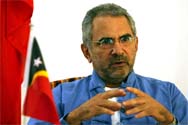Ramos-Horta looks to the future after near-fatal shooting
 Dili - Three months after a near-fatal assassination attempt, East Timor President and Nobel Peace Prize laureate Jose Ramos-Horta is back in his office and full of plans.
Dili - Three months after a near-fatal assassination attempt, East Timor President and Nobel Peace Prize laureate Jose Ramos-Horta is back in his office and full of plans.
Still pale, Ramos-Horta lays out his work schedule from his home in the capital, Dili, in an interview with Deutsche Presse-Agentur dpa:
"I have three priorities for the next two years: first, the reorganization of the police force and Army. Second, serious efforts to alleviate poverty with cash for the most vulnerable, like old people and veterans. They should get 100 US dollars monthly. Third, to invest in infrastructure projects that create a lot of jobs."
The president receives guests in his elegant wood and bamboo house on Kennedy Boulevard. His office there is only a stone's throw away from the street where on February 11 rebels fired the gunshots that nearly cost him his life.
Ramos-Horta doesn't talk about the attack that saw him hospitalized in Australia for two months. Earnest and wearing a blue T-shirt that reads "Presidente," the 58-year-old sits at his desk and prefers to talk about the rosy future he sees for his 1 million countrymen and -women
Most of them live in poverty in the tiny South-East Asian nation that was shaken in early 2006 by civil unrest, largely blamed on high unemployment among East Timor's young people.
Ramos-Horta, who won the 1996 Nobel for leading the diplomatic campaign for East Timor's independence from Indonesia, advised the East Timorese to let his government have time to make improvements.
"The problem is that people are too impatient," he says. "This country is only six years old. I have travelled and seen developing countries all over the world. I hope that we can do better than Guatemala in 20 years, and that country has been independent for 200 years."
East Timor was a Portuguese colony for 400 years before neighbouring Indonesia invaded it in 1975 and occupied it for 24 years. In a 1999 UN-supervised referendum, the East Timorese voted for independence in polling that was preceded and followed by pro-Indonesian militias running amok. A thousand people were killed, and 70 per cent of East Timor's infrastructure was destroyed.
An Indonesia-East Timor Commission of Truth and Friendship has finished three years of investigations and public hearings, at which witnesses testified that they saw Indonesian soldiers and Timorese militiamen killing scores of unarmed civilians. The panel's final report was expected at the end of this month.
"I am disappointed that many of the senior Indonesian military officers involved did not seize the opportunity to confess and apologize for their failure to control the situation," Ramos-Horta says.
The divorced president lives alone on the edge of Dili and is reading Nelson Mandela's book From Freedom to Future as he recovers from the assassination attempt. It lies on a table on his terrace next to a stack of magazines, which include Men's Health.
On the wall hangs pictures of Che Guevara, John F Kennedy and Mao alongside movie posters of Casablanca and The Godfather. A plush Santa Claus dangles in the window.
An affluent East Timor is only a question of time for Ramos-Horta.
"We have enough money," he says. "We have enormous resources in oil and gas."
Money from the sale of those resources has put 2.6 billion dollars in East Timor's oil fund, and Ramos-Horta says he wants to invest that money for his country and also use 100 million dollars of it to set up an investment bank in East Timor that would help small businesses.
"We could charge 7-per-cent interest, which is less than half of what the other banks charge here," he says. "That would give us a good return and help the community."
The president has become more serious than in years past, but his winning smile and easy charm, which won the world over to his land's cause, are still there.
He is also thinking about the time after he leaves the presidency. He says he finds that he, as a Nobel laureate and experienced diplomat, would still have an indispensable, if diminishing, role to play for his country.
"East Timor is so small - it is of no consequence to the world, so individuals may have a greater impact because of their personality," he says. "But in a few years, this country will be peaceful and prosperous. By then it will not matter so much if we have a new generation of leaders who do not know how to play on the international stage." (dpa)